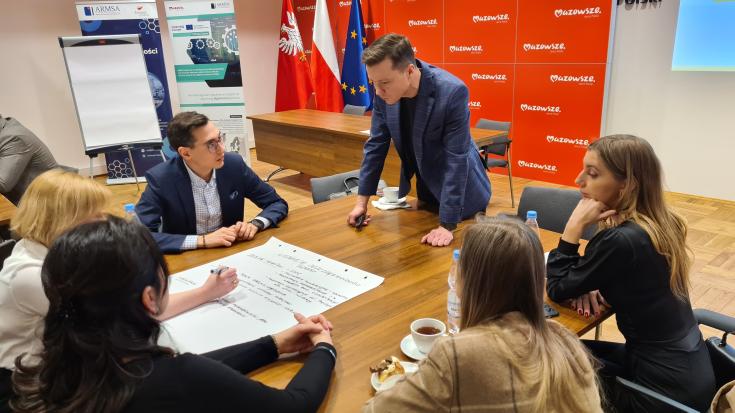Mazovia's Regional Dissemination Event on February 26th.

On February 26th the Polish partners Marshal's Office of the Mazowieckie Voivodeship, Department of Regional Development and European Funds and the Agency Development of Mazovia, Entrepreneurship and Investment Center welcomed their regional stakeholders to attend their Regional Dissemination Event.
The meeting was attended by 27 people, including representatives of local government units and institutions such as Lukasiewicz Research Network; Higher School of Public Administration in Ostrołęka; Warsaw University of Technology, Plock Branch; Płock Industrial and Technological Park; as well as representatives of the Marshal's Office of the Mazovian Voivodeship and the Agency Development of Mazovia.
The purpose of the meeting was to exchange experience and develop solutions for retaining and attracting specialists to the Mazovian region, as well as the development of smart public services for the SME sector (e-services). Participants were able to familiarize themselves with the key stages of the learning and knowledge exchange process, such as the IPeR and ReCo reports, which help to better understand regional contexts and facilitate cooperation between project partners.
The invited guests also had the opportunity to learn about the results and methodology of the Joint Study, providing practical solutions for the use of artificial intelligence in public services for SMEs. It was emphasized that the Joint Study supports the development of regional policy changes according to the specifics of the area, which translates into improved efficiency and accessibility of public services through the use of advanced digital technologies. It was also pointed out that artificial intelligence can improve public services, make them fairer and more transparent, and strengthen a culture of innovation tailored to local needs.
The main presentation showed how the results of project activities are based on the exchange of knowledge and experience between partners, and how they support the development of proactive public administration services, including those based on artificial intelligence and digitization. They also highlighted their impact on the development of regional policies and strategies and competence building among project stakeholders.
Later in the meeting, a workshop was held that allowed participants to discuss key challenges and opportunities for the development of digital tools for SMEs. As a result of the discussion, it was agreed that it is crucial to promote available digital tools and build strong cooperation at the local level, which will contribute to the development of SMEs and facilitate the implementation of innovative administrative services.
